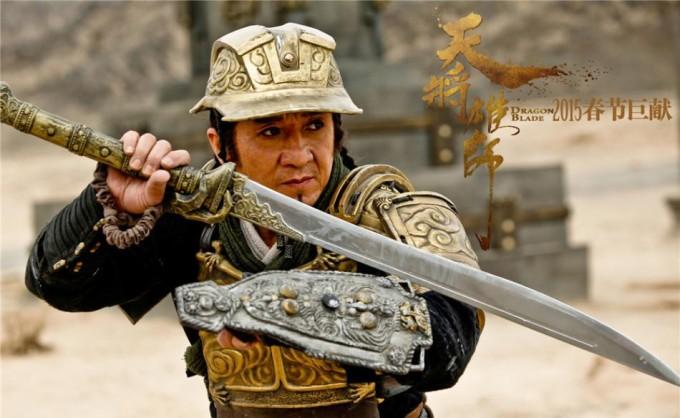
【電影簡介】
西漢漢元帝年間,西域都護府大都護霍安遭奸人陷害,淪為奴役,被刺配至雁門關修城。恰在此時,羅馬將軍盧魁斯護衛遭到哥哥迫害的羅馬小王子逃命至雁門關。雙雄在西域戈壁相遇,從開始的兵戎相見到惺惺相惜,最終化敵為友。一日,霍安為洗清自己冤屈四處追查時,無意間撞破了好兄弟殷破與羅馬大王子提比斯不可告人的秘密。與此同時,提比斯為追殺盧魁斯與小王子一行人也親自帶兵趕來西域。為保護小王子和西域諸國的安危,霍安與盧魁斯聯手與提比斯在戈壁大漠展開了一場生死之戰。
【音頻文本】
7 years ago when Beijing staged the Opening Ceremony of the 29th Olympic Games, I was moved to tears thinking this grand event could be an opportunity for the world to understand the friendly Chinese people and their culture. Now seven years later, Chinese historical action film "Dragon Blade" also calls for understanding and friendship in the same spirit, it made my eyes moist again, but failed to create the same emotional ripples that resonated in my heart 7 years ago.
Hong Kong director Daniel Lee's "Dragon Blade" stars Jackie Chan and tells the story of a Roman Legion that found its way to the northwest border region of the Han Empire. Roman general Lucius, played by John Cusack, clashes with Jackie Chan's character Huo An, a commander of a Silk Road Protection Squad. Circumstances push the two sides to a truce, before both sides face annihilation by the usurping Roman Emperor Tiberius and his overwhelming expedition troops.
Director Daniel Lee is most commonly known for the chic, UFO-shaped helmets in his historical films. According to some Chinese critics, this excess of originality amounts to a lack of respect for history. The mistake regarding the location of Yumenguan, or the Wild Geese Gate, in "Dragon Blade" suggests he is not very well informed about China, although he does show some knowledge regarding Western culture. His 2011 movie "White Vengeance" was a Gothic retelling about the life of first Han Dynasty Emperor Liu Bang, which bore much resemblance to the Shakespearean story of King Lear. In "Dragon Blade", he's done a good job highlighting the engineering prowess of the Roman Legionaries and offers remarkable display of the Roman shield wall technique.
The visual aspect of "Dragon Blade" exceeds the standard of a Chinese blockbuster production, and the story would have developed smoothly, had Daniel Lee been able to rein in the ill-placed enthusiasm of producerJackie Chan. Over his entire career, the Hong Kong martial artist has built and maintained an upright profile with consistency and resolve, and lately he has developed a habit of using movies as a venue for expression. Of course movies, like other art forms, are a body of expression by nature, but among all the mediaavailable to filmmakers' discretion, putting ideas in an actor's mouth is perhaps the laziest and most awkward choice, albeit the most explicit.
In "Dragon Blade", Jackie Chan takes upon his character to voice his longings for peace and mutual understanding. His wishes are not unwelcome in the wake of recent unrest in Northwest China where the story is set. But time and time again, he interrupts the pace of the film with empty speeches without actually reaching the audience. In fact, the 7-year-old actor Jozef Waite has better chance of winning people's heart with a touching song than Chan's sincere words.
So, now comparing the similar emotional encounters, I recognise the changes in my own thinking over the years. No longer the innocent idealist who thought the simplest manifest of good will was enough to deserve a good turn, now I've realised that action speaks louder than words and nothing promotes mutual understanding better than common interest. The most effective way to foster understanding and promote stability in the border region is to bring prosperity to the locals, and to achieve that we'll have to rely more on investment in the "Silk Road Economic Belt" project than on Jackie Chan's honourable persistence in the movie industry. Anyone can be a willing member of the Silk Road Protection Squad if they have a stake in the joint venture.
輕松調頻EZFM 微信mrweekly











